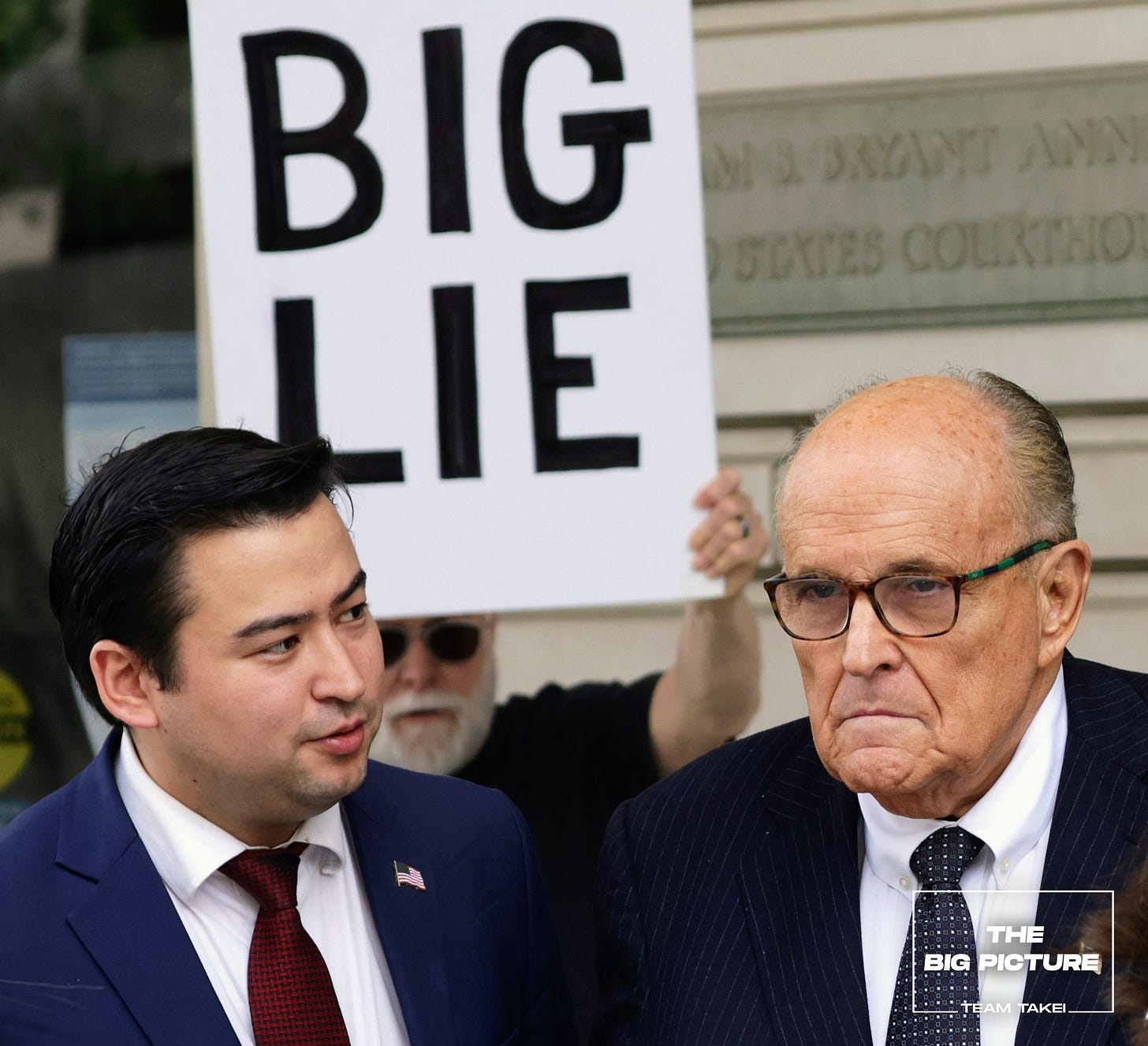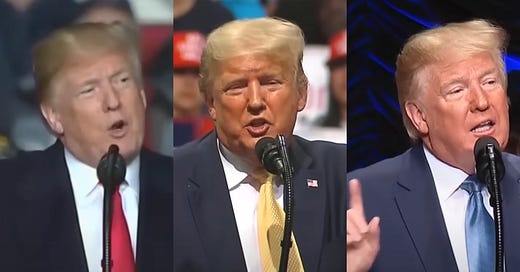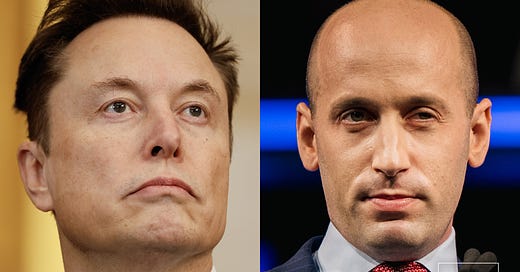
Georgia On His Mind
Our resident legal expert explains how the Georgia investigation into Donald Trump's election interference will likely lead to charges soon.

While news headlines, pundits and GOP allies of the ex-President have been focused on the indictments in Manhattan and Florida against Donald Trump, another case could soon dominate headlines. It is out of Fulton County, Georgia, led by District Attorney Fani Willis.
Here’s to Black women, leading the way!
Willis’ current investigation concerns a sprawling conspiracy by Trump and his allies to interfere with the Georgia election in 2020, with dozens of witnesses and many potential co-defendants who all had the same goal of undoing a legitimate election.
The case gets to the heart of the criminal activity Trump and his cohorts were involved in at the state level in Georgia. The public might overlook falsifying business records to cover up a hush money payment to a porn star—even though they shouldn’t. It might wonder whether keeping boxes of classified documents in Trump’s Mar-a-Lago bathroom is a crime of the highest order—and it is.
But it’s hard for the public to ignore an attempted overturning of a democratic election by the then-sitting President and his allies.
We truly live in historic—yet dangerous—times.
Today in The Big Picture, lawyer and political analyst Jay Kuo and I take a closer look at the case in Georgia and what kinds of crimes might be included in the grand jury recommendation to indict. We’ll also explore whether the charges likely will go all the way up the ladder to ensnare the ex-President himself.
— George Takei
On election night in November of 2020, the nation’s eyes were upon the battleground states, including a surprising result coming out of Georgia. As votes in the more populated counties continued to come in, Joe Biden had pulled ahead of Donald Trump.
By the time the counting was finished, Biden was up by nearly 12,000 votes.
Georgia Had Gone to Biden
To nearly everyone’s astonishment, the Peach State joined the swing states of Pennsylvania, Michigan, Wisconsin and Arizona in moving from the red column in 2016 over to the blue in 2020.
It was the first time since 1992 that a Democrat had won in Georgia.
But Donald Trump and His Campaign Didn’t Accept Defeat
Soon after the outcome became clear, the Trump Campaign began to question the results of the election publicly—which turned out to have been their year-long plan all along.
They were aided by conspiracy theories bubbling up from the depths of the internet about how votes were flipped by election tabulating machines, ballots were brought in by suitcases, and dead people were voting by the hundreds of thousands—none of which was true, but all of which the Trump Campaign began to amplify.
The Deception Became Known Widely as the Big Lie
To push out the Big Lie as widely and quickly as possible, the Trump campaign dispatched some of its most dishonest purveyors of misinformation—including attorneys Rudy Giuliani and Jenna Ellis—to the state of Georgia. There they held hearings with sympathetic Georgia state legislators and repeated demonstrably false conspiracy theories, all in an effort to convince them they needed to act to overturn the election result.

Among these were debunked claims suitcases full of ballots appeared from below tables, suddenly to be counted. Video footage had already made clear these were actually ballot boxes containing real, as-yet uncounted ballots the election workers simply had stored beneath the table the night before.
This was just “normal ballot processing,” according to the Georgia Secretary of State’s office.
Trump and his campaign had been told this in no uncertain terms and even shown the full video, but they ignored the evidence and kept repeating the incident, adding fuel to the Big Lie.
Fake Electors Declare the State of Georgia for Trump
Behind the scenes, Giuliani and people like Mike Roman—head of election day operations for the Trump campaign—organized fake elector groups of GOP officials in seven different swing states to further another nefarious plan.
They knew that if on Electoral College Day on December 14, 2020 the only official slates of electors were those the voters had actually elected, there would be no way Trump could later lay claim to those states’ electoral college votes.
They Needed a Bogus Mechanism
The Trump Campaign needed some kind of “official” way to allow the states’ votes to go to Trump should the courts rule their way.
They also wanted to present Congress with competing sets of “official” electors, so that then Vice President Mike Pence could announce there were competing slates and refuse to count the battleground wins as official wins for Biden.
To achieve this charade, the Trump campaign worked with local GOP officials—including 16 fake electors in Georgia—to create a fake slate of electors who certified falsely under oath they were the duly elected slate for the Republican candidate, Donald Trump.
After Fani Willis issued letters to these false electors indicating they were targets of her investigation, at least half of them received immunity deals in exchange for their testimony in the Georgia elections interference case.
The Trump Campaign Had the False Certification Sent to Congress
The deliverable here was a signed certification of false electors. And the hope was VP Mike Pence would agree to recognize it, creating enough chaos to either declare the election for Donald Trump or send it back to the state legislatures, such as the one in Georgia, which were all controlled by the GOP.
It very nearly worked, but in the end Mike Pence refused to go along with the scheme.

That’s why Trump put a target on Pence’s head and why the insurrectionists were calling for him to be hanged—one of many threats to which Trump acted with approval.
Meanwhile in Washington, DC an Attempted Mutiny
While Giuliani was busy spreading his lies in Georgia and organizing the fake electors, back in D.C. within the Justice Department a battle was brewing. A Trump-allied lawyer named Jeffrey Clark—who helped push the Big Lie inside the government—suggested the Department itself could get involved.
What if the DoJ wrote a letter, he suggested, that stated the Department was investigating irregularities in the election in Georgia while also advising the Georgia legislature to reconvene to reconsider its electoral college votes? In other words, what if the Justice Department were to put its finger on the scale and help Trump claim victory after he had already lost the election?
Trump liked the idea, but acting Attorney General Jeffrey Rosen shot it down. That would be political interference of the worst kind, Rosen warned.
But that didn’t stop Trump.
He declared he planned to replace Rosen with Clark, no doubt so he would have a Justice Department willing to do his bidding. The only thing that stopped this was a threat of mass resignations of the Department’s leaders—something from which Trump could not come back politically.
Trump backed down and Clark didn’t become acting AG. That meant, thankfully, the Georgia letter never got sent.
But it was certainly an attempted hijacking of the presidential election that nearly succeeded.
The Trump Campaign Goes After Black Election Workers in Georgia
It wasn’t enough for the Trump campaign to gin up false conspiracies and work behind the scenes to overturn the election through their friends in the state legislature. The campaign wanted to put a human face to the fraud, so they chose two Black ones.

Ruby Freeman and her daughter Wandrea ArShaye “Shaye” Moss were both former election workers from Fulton County, Georgia. They became the targets of harassment and threats after conspiracy theories—egged on by the Trump campaign—drove them into hiding.
Giuliani falsely told legislators a video showed "Ruby Freeman and Shaye Freeman Moss ... quite obviously surreptitiously passing around USB ports, as if they're vials of heroin or cocaine."
And Trump also made the two of them specific targets, even referring to Freeman as a "professional vote-scammer and hustler”—something demonstrably untrue.
Then There Was the Infamous “Perfect” Phone Call
On January 2, 2021, with the Electoral College vote already well behind everyone and Georgia in the blue column, Trump had still not given up on the idea of creating absolute electoral chaos. He and a team from the White House called up Georgia Secretary of State Brad Raffensperger, whom Trump then pressured to do his bidding.
But Raffensperger had planned ahead and recorded the call.
On that tape, Trump threatened Raffensperger with unspecific “criminal charges,” saying he was “taking a big risk” by not finding the nonexistent fraud.
Trump said:
“The people of Georgia are angry, the people of the country are angry.”
“And there’s nothing wrong with saying, you know, that you’ve recalculated.”
Raffensperger responded:
“Well, Mr. President, the challenge that you have is, the data you have is wrong.”
And then Trump let loose the phrase that could send him to prison for election interference.
He stated:
“All I want to do is this. I just want to find 11,780 votes, which is one more than we have.”
“Because we won the state.”
“So what are we going to do here, folks?"
"I only need 11,000 votes. Fellas, I need 11,000 votes. Give me a break.”
Other Phone Calls by Trump
While the Raffensperger call is the most infamous, it’s not the only one.
According to an interview given by grand jury foreperson Emily Kohrs, Trump also had phoned up Georgia House Speaker Ralston asking him to convene the legislature so it could overturn President Biden’s victory in the state.
Trump reportedly asked Ralston who would be able to stop him from holding a special session.
Ralston responded:
“A federal judge, that’s who.”
The grand jury heard a tape of that call, too, which lasted some 10 minutes.
Trump also telephoned Francis Watson, Georgia’s chief elections investigator based in Fulton County, urging her to find “dishonesty” that could help overturn the election results.
These Things Are Crimes
We now know a great deal about the activities of the Trump campaign in the state of Georgia following the election Joe Biden won handily.
But are we talking about crimes here or just overzealous advocacy?
False Claims of Election Fraud
It is a crime under Georgia state law to assert false claims of election fraud in order to interfere with the results of an election. The main question will be whether Trump and his allies knew their claims to be false at the time they made them.
And there is plenty of evidence to show they did.
This includes the fact all of their own experts and officials told them there was no fraud. It includes the fact they commissioned outside, third parties to conduct investigations that also confirmed there was no fraud. It includes the fact all of their claims had been debunked and explained to them over and over.
And the investigative grand jury—having heard and evaluated all this evidence—already unanimously found in its report that there was, in fact, no evidence of widespread election fraud in Georgia.
Intimidation of Election Workers
It’s also a crime to threaten and intimidate election workers.
The harassment of Ruby Freeman and her daughter Shaye Moss was real and devastating. Trump supporters barraged them with racist and hateful messages based on entirely false allegations the Trump campaign promulgated and repeated.
After the release of Trump's phone call with Raffensperger, the physical threats grew so frequent and so dangerous authorities encouraged Freeman to leave her home because it was unsafe for her to remain there.
The harder question from a legal standpoint is to find a direct, causal nexus between the Trump campaign’s words and the terrorism that resulted. What the District Attorney may have discovered and included on this matter isn’t presently known.
Fake Electoral College Certifications
The creation of a false electoral slate for the state of Georgia is also a crime because it involves creating false records, with misrepresentations under oath, for the purpose of defrauding other parties, including the state of Georgia.
Here, there were defendants who participated in a conspiracy to submit false records and documents in order to help steal an election, some of which are cooperating with authorities.
Racketeer Influenced and Corrupt Organizations—RICO
Finally, there is a possible case for racketeering.
A state RICO law targets certain organized enterprises that commit one or more prohibited acts including fraud. Fani Willis brought in some high powered RICO experts, while she herself is also experienced in bringing such complicated cases.
There are benefits and drawbacks to bringing a RICO claim.
The benefits include a broader investigation into the workings of the criminal enterprise itself, with the possibility of nailing those in charge of it despite their having interposed other actors between themselves and the alleged illegal behavior. The drawback is the case may become overly complex and difficult for a jury to understand.
At this point, it isn’t clear which path Willis has decided to go down.
Indictments Will Likely Be Issued This Summer
The Fulton County District Attorneys’ Office first empaneled an investigative grand jury that heard testimony from 75 witnesses. While that grand jury didn’t itself have the power to indict, it was tasked with creating a report which recommended criminal indictments for more than a dozen people.
At least eighteen people were notified they were targets of the investigation and therefore likely defendants. These include Rudy Giuliani, the head of the Republican state party in Georgia and the fake electors who participated in the scheme.
As discussed above, the unredacted portion of the investigative grand jury’s report declared there was no widespread election fraud which is a key finding that could lead to election interference charges based on knowing misrepresentations by the Trump campaign.
We don’t know if Trump himself is to be indicted.
But according to an interview given by the grand jury foreperson, there are not going to be any surprises in the indictment leading many to believe the ex-President is on the indictment list.
The foreperson said:
“I don’t think that there are any giant plot twists coming. I don’t think there's any giant ‘that’s not the way I expected this to go at all’ moments."
“I would not expect you to be shocked."
After all, it would be surprising if all his co-conspirators—many of whom were in the same meetings as he was—were indicted but Trump himself was not.
Trump’s Lawyers Strike Back
Trump’s lawyers have filed motions to quash the grand jury report and block prosecutors from using any evidence gathered during the investigation, largely on grounds the grand jury foreperson should not have spoken to reporters.
They’ve sought to remove Willis from office as well as the judge from the case.
But both of these motions are “Hail Mary” type moves and neither of these motions is likely to affect the case.
Meanwhile, Georgia state legislators have passed a law that could threaten local prosecutors with removal. But that doesn’t go into effect until 2024 and it is unlikely to affect Willis’ case.
And that case likely will begin with indictments this summer.
How do we know this?
Willis sent a “heads up" note to local authorities to prepare for an indictment decision to come sometime after the next grand jury session begins next week on July 11.
The presentation of the case to that grand jury will take a lot less time and be more streamlined, because Willis and her team will be able to present the most relevant testimony in a more directed way.
That means we could see indictments come down against Trump and his allies as soon as the end of July or early August. In fact, Willis told local judges not to schedule trials for the first half of August.
And unlike the jury pool in the Mar-a-Lago classified documents case—which pulls from Trump-leaning counties in Florida—Willis’ jury will pull from Fulton County, home of Atlanta, which skews heavily Democratic and anti-Trump.
And that—along with the damning evidence already known so far—is likely going to create significant legal peril for everyone in Trumpworld named in the criminal complaint.
That includes the ex-President himself.
















The irony being, of course, that this will almost certainly make his supporters even more likely to support him.
I'm confused about one thing in particular. Why did they need fake electors? If trump had won, weren't there already electors that he would have received with a win? I keep remembering how the main stream media also helped push the big lie, reporting on it like it had validity. If they had dusted off their investigative skills, all of this could have been uncovered and debunked long before it was. The media is still doing this crap with President Biden and they need to somehow be held responsible for their part in this. In actual hindsight, if they had done their jobs in 2016 instead of the constant drumbeat of Hillary's emails, she probably would have won. Unforgivable.